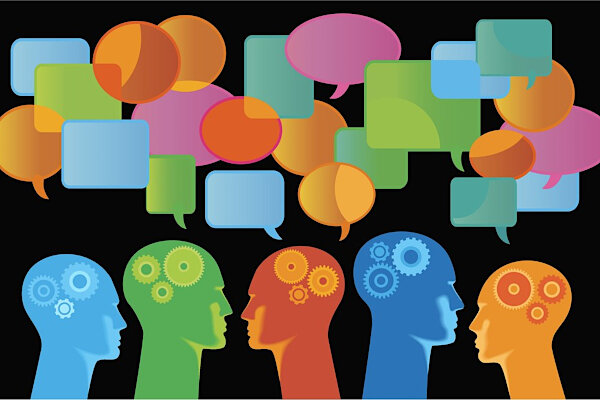Iran (IMNA) - The practice of bilingualism is prevalent throughout the world, in all societal strata, and among all age groups. The proportion of bilinguals is considerable, even in nations with large populations of monolinguals.
What causes someone to be bilingual?
Language expert Leonard Bloomfield used "bilingualism" to describe the command of two languages as if each were a mother tongue. Assuming equal written and spoken proficiency in both languages, this is an idealized view of perfect, balanced bilingualism. A bilingual speaker, according to this definition, is made up of two monolingual speakers. This kind of bilingualism is exceedingly uncommon, though, and bilingual people really have a wide range of language profiles. Each has a different connection to the language.
There are further bilingualism hypotheses. While Swiss researcher François Grosjean contends that bilingual persons utilize two or more languages in their daily activities, Canadian linguist William F. Mackey defines it as the alternation of two or more languages. Bilingual individuals are multi-skilled individuals who develop linguistic abilities according to the context of learning and using the second language, according to Vivian Cook, the British linguist. As a result, a person might be classified as bilingual even if they only have a limited command of the second language.
A practical definition of bilingualism nowadays would be the regular and alternate use of at least two languages by an individual, which includes millions of language users.
Evaluating competence
Naturally, there is a broad range of linguistic proficiency levels. According to French linguist Ranka Bijeljac-Babi, two factors should be taken into account while discussing bilingualism: the age at which a second language is learned and the degree of competency in the acquired language and mother tongue.
When languages are taught in early childhood, before the age of three or four, this is referred to as "early simultaneous bilingualism," since the two languages develop roughly simultaneously. It is referred to as "early consecutive bilingualism" before puberty since the second language is added after the first language has already been developed. "Late bilingualism" refers to learning a second language beyond puberty.

Establishing the degree of competency is more challenging since diverse abilities to speak, write, and understand may exist in the same person. While some people can write extremely well but struggle to speak, others are far better at writing than speaking. Inevitably, having both talents at a high level in many languages is fairly conceivable.
Even if two languages are taught at the same time, one will eventually overpower the other due to usage situations. It is the language that will be more naturally engaged, resulting in fewer pauses from the speaker and the richest, most complex phrases.
Not always the first language is the dominant one. A second language's lexicon is progressively built up by an immigrant to a country with a different language. When the original language is not used at all and the second language is used often, the second language will eventually take over as the primary language.
The mental dictionary
All of the knowledge we have about words and their properties is referred to as our "mental lexicon" in the field of psycholinguistics. Each person has a mental lexicon they may use to retrieve linguistic knowledge.
The mental lexicon of a monolingual speaker is thought to have 40,000–60,000 items, from which they will draw information whether speaking, reading, listening, or writing. The process is identical for bilingual speakers, but logically, there are more entries since the mental lexicon combines information from many recognized languages.
It's up for discussion on how this occurs. Regarding how bilinguals access information kept in the mental lexicon, there are two major theories.
According to the "language-selective access" theory, the other is muted when a bilingual person speaks one language. The process of switching between languages would include going through a form of switch that would enable one language to be "switched off" in order to "switch on" the language that is now being utilized. This theory assumes that there won't be any linguistic interference.
The "language-nonselective access" concept proposes that languages interact and affect each other inside the mental lexicon. Candidates from all known languages would be taken into account when recognizing a word.
When we study a second language, the mother tongue serves as a foundation for learning concepts in the second language. The learner is more likely to be able to access the meaning of words directly in the second language rather than through the first.
The loss of a native language
Some may recall a sequence in the film L'Auberge Espagnole in which the main character, portrayed by Romain Duris, dreams that he can no longer speak in his own tongue, French, and must instead converse in the language he has come to master, Spanish. The phenomenon of attrition mentioned here is really real; you may "lose" your original language.
Attrition manifests itself in difficulty accessing the original mental lexicon of an immigrant who has lost contact with their home language.
According to the study of French linguist Barbara Köpke and her colleagues, this type of language loss is particularly common in people of migrant origin. Attrition manifests itself in difficulty accessing the original mental lexicon of an immigrant who has lost contact with their home language. The good news is that, even if contact with the original language is severely limited, a tiny amount of interaction with other speakers is enough to maintain the first language working normally in adulthood.
There are several routes to bilingualism. While it is difficult to define and may often be stigmatizing, it is critical to appreciate all languages and their variety of uses.
There is no such thing as a "good" or "bad" bilingual, but research shows that encouraging early language acquisition is vital and that frequent daily practice will assist in developing language abilities more efficiently.


Your Comment